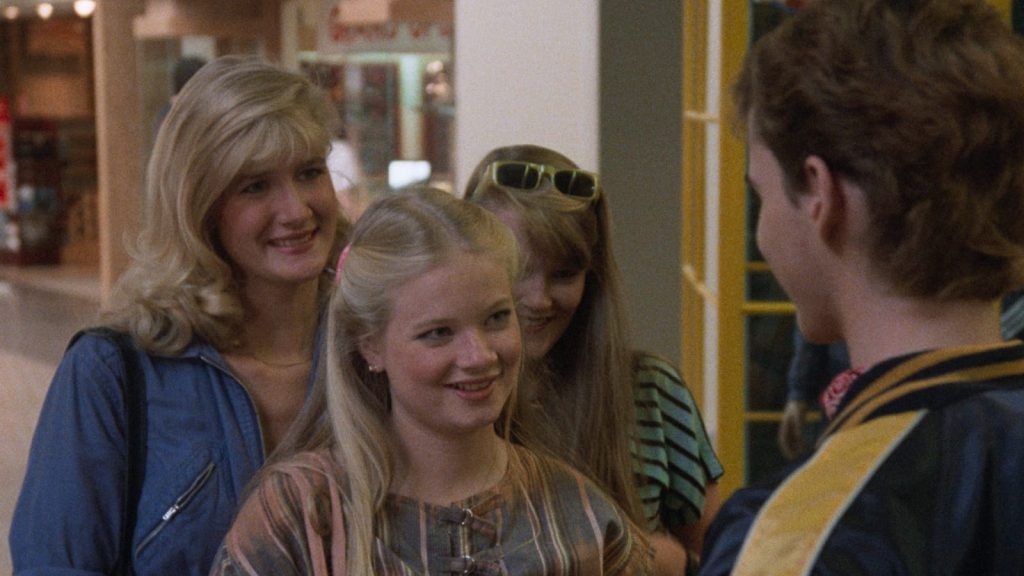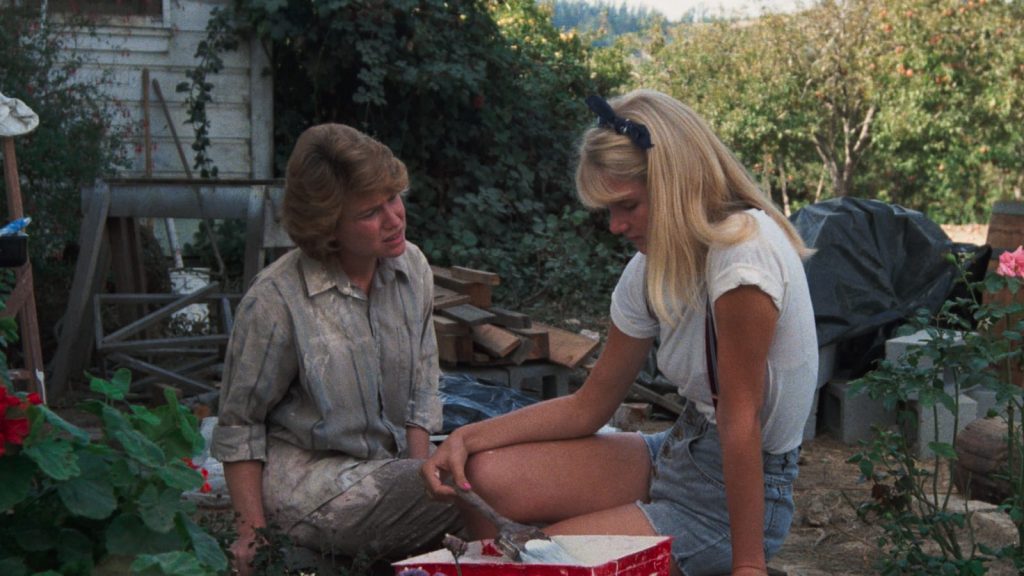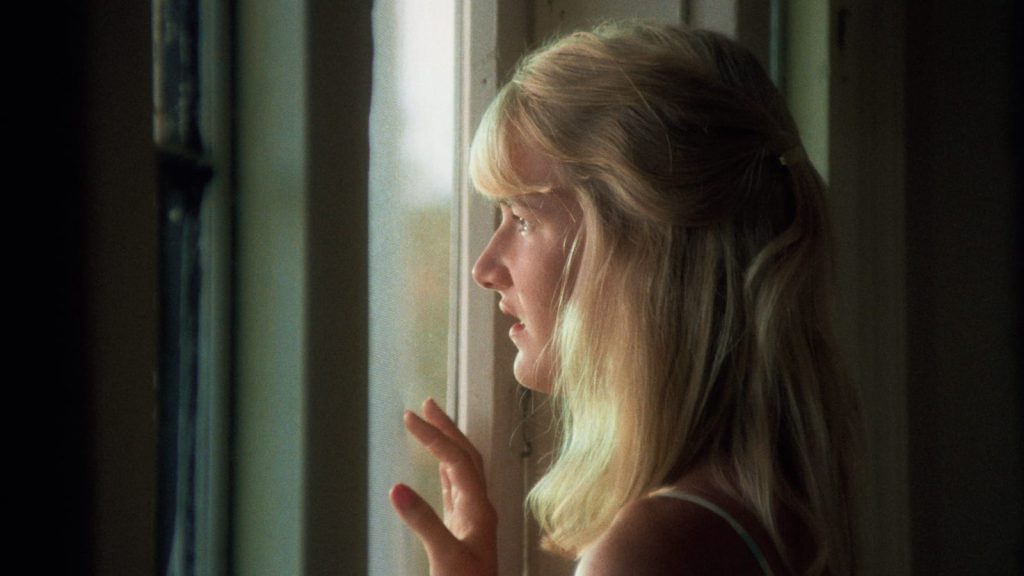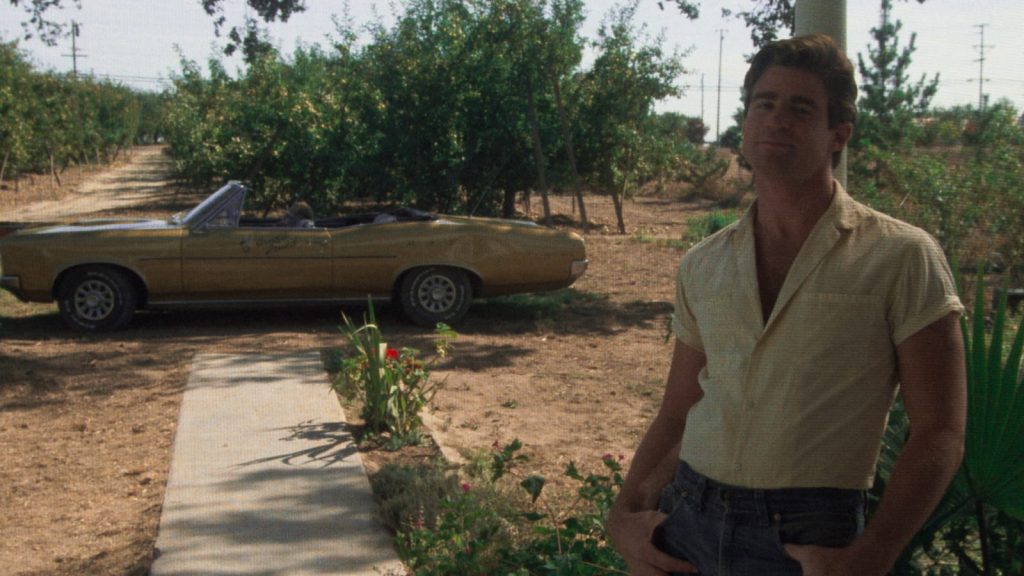To give only a cursory look to a film such as 1985’s Smooth Talk would be doing it a great disservice. On its surface, the film might come off as a lightly dramatic coming-of-age tale of a young woman whose family no longer relates to her as she has become a bit boy-crazy. You might expect her to face a few hardships in the midst of her burgeoning womanhood, but in the end she will learn some important life lessons while backed by some quality tunes. Such an evaluation would be incredibly reductive for this nuanced tale of the inherent dangers that women face when trying to find their place in the world. Not many films dared to go as deep into the realities of womanhood at this time, so it should not come as a surprise that such a tale would come from a female auteur, the amazing Joyce Chopra. Based on the short story “Where Are You Going, Where Have You Been?” by the prolific Joyce Carol Oates, Smooth Talk takes a story that is often taught in schools and brings a three-dimensional depth to it that remains as poignant and breathtaking as the day it premiered.
The thrill of youth is apparent from the opening frames of Smooth Talk, as three young girls are shocked awake after unintentionally falling asleep on the beach. The girls are pulsing with adrenaline and giddiness as they race to make it to their meeting spot to be picked up from the mall before anyone realizes their detour for the day. Their only hope is to hitch a ride from a not-exactly-upstanding gentleman in a pickup truck who perks up at the sight of them. He gives them pause, but they are young and indestructible. While thankfully nothing untoward happens in this brief ride, it is an important note to begin the movie on, if only to show the glimmer of malice that could be around the corner for these maturing young women.

The de facto leader of this trio of girls is Connie Wyatt (Laura Dern), a restless 15-year-old who is becoming more and more obsessed with the idea of boys in the course of her awakening sexuality. While Dern may be a household name these days, the then 17-year-old was tackling one of her first major lead roles which she imbued with such complexity. The camera catches her golden sun bleached hair and elongated frame as she towers over many of her costars. In any one moment, Chopra had a way of making her look incredibly mature or very childlike – a very sly trick from a talented filmmaker. Connie is a character of two distinct sensibilities. At home, she is shrunken and somewhat beaten down from a strained relationship with her mother. Her voice is slight and she often appears on the defensive as she pushes back on the parental guidance thrown her way – both sensible and harmful. Her mother Katherine (Mary Kay Place) is very short with her, all the while heaping praise on her older sister, June (Elizabeth Berridge). Yet, you can also see that her life is not the greatest as she channels all her frustration into fixing up the house while her husband (Levon Helm) floats around being willfully oblivious to his crumbling family unit.
Outside of the household is where Connie really thrives in her mind. Not only does she shed some clothing and glam herself up with her friends, she also presents with a more vivacious and forward personality. Her two best friends are likewise curious about boys, but Connie appears to be viewing her sexuality as a form of independence from the lesser life she has to lead at home. Her appetite soon grows beyond that of the local young teens at the mall as she yearns for someone a bit more mature. Although inexperienced at heart, her natural beauty and spirited personality earns her the attention from boys she wants at the local soda shop, while simultaneously catching the eye of some she might not. The misleadingly named Arnold Friend (Treat Williams) first makes a cryptic comment to Connie about having his eye on her, retreating into the background for most of the picture until reappearing in the tension-filled climax of the film. The final twenty minutes function as something of a one-act play as Connie confronts the dangers that come with her desire to be noticed.

The point of Smooth Talk is not to condemn a woman for wanting to express her sexuality, but rather take a hard look at the real-life dangers that naturally crop up when you are a woman. Laura Dern is absolutely fearless in her portrayal of Connie, balancing the hopeful maturity of the aspiring woman with the youthfulness of her age. She is such a ray of light as she moves from scene to scene, and your stomach sinks anytime you sense danger in her midst. Treat Williams is devilish and playful as Friend, coaxing Connie to an uncertain outcome rather than exude straight up brutality. As impactful as his character is, you could argue that Mary Kay Place as her mother is ultimately the more pivotal force in her life. Their dynamic is steeped in a misunderstanding of one another that causes great pain, but it is not a hopeless cause. Smooth Talk is an engrossing and powerful narrative debut from director Joyce Chopra, and the performances from all involved are something special to behold. There is a great deal to unpack within this narrative, which is what makes it such a rewarding experience.

Video Quality
Smooth Talk has been granted a director-supervised 4K restoration from the original 35mm camera negative via the Criterion Collection for this stunning new Blu-Ray disc. The film grain present is beautifully natural and consistent while allowing fine details to shine through. Subtle details stand out with greater clarity than ever before, especially in clothing or elements of the production design. Exploring the Wyatt house or the mall with this new transfer almost makes it feel like a whole new film. Facial features are likewise detailed with fine lines and pores detectable alongside natural skin tones. Colors are vibrant without being unnatural for the environment. The transfer affords several opportunities for them to pop off the screen with some bold color choices in the clothing or the neon lights of the diner. Black levels are deep and inky without any noticeable blocking or compression artifacts. This is by far the best the film has looked on home entertainment.
Audio Quality
The Criterion Collection brings us this new Blu-Ray with a remastered LPCM 1.0 track that offers a very strong audio experience. The dialogue holds up quite nicely, coming though clearly without being stepped on by the music or other effects. The environmental effects are delineated nicely including the chatter of the mall patrons and the vehicles going by on the highway. This track does not present with any glaring instances of age related wear and tear. This is a track that represents the film in a way that is practically perfect. Optional English (SDH) and Spanish subtitles are provided on this disc.

Special Features
The Criterion Blu-Ray of Smooth Talk includes a substantial booklet featuring the new essay “Girl Power” by poet and friend of director Joyce Chopra, Honor Moore, in which she discusses the themes and importance of the film. This booklet also contains an article by author Joyce Carol Oates entitled “When Characters from the Page Are Made Flesh on the Screen,” which was published in the New York Times in March 1986. In this essay, Oates discusses her feelings regarding having her work adapted to the screen. Finally, the original Joyce Carol Oates short story “Where Are You Going, Where Have You Been?” is included in its entirety. All of these works provide a great amount of context and insight into the film that is so worthwhile. The on-disc special features are as follows:
- Short Films: Three of director Joyce Chopra’s early documentary short films are provided here.
-
- Joyce at 34: A 28-minute film from 1972 co-directed by Claudia Weill which follows Chopra as the subject during the birth of her child and how she wrestles with maintaining her identity as a professional filmmaker while being a mother. There are some interesting intergenerational conversations that show how women from different eras view the responsibility of motherhood. Be forewarned, Chopra begins the film with showing the birth of her child in unsparing closeups.
-
- Girls at 12: A 30-minute film from 1975 that follows three girls growing up near Boston and how they change in various ways during their formative teenage years. The impact of society’s expectations of girls and women are explored including how the natural ambition and pursuit of knowledge often fade into the background as superficial social constructs are imposed upon them.
-
- Clorae and Albie: A 37-minute film from 1975 that focuses on two young Black women who have been best friends since childhood whose lives have taken different paths. This film goes to show how what one wants out of life is often very different than what you end up with.
- Joyce Chopra
-
- 2020 Interview: A new 17-minute interview in which Chopra discusses how she got her start in filmmaking, the path that her career has taken over the years, the themes she has been most interested in tackling and more. This is a good condensed look at an incredibly talented filmmaker.
-
- 1985 KPFK Radio Interview: A 30-minute archival audio interview in which Chopra discusses various elements of the film as it premiered in theaters including discovering the Joyce Carol Oates short story, her career in documentary films, transitioning to narrative films, bringing a literary quality to her filmmaking and more. It is very worthwhile to get Chopra’s insight into the film at the time of release.
- The Women of Smooth Talk: A 56-minute virtual discussion recorded in September 2020 in which Film at Lincoln Center brought together director Joyce Chopra, author Joyce Carol Oates and actor Laura Dern for a Q&A as a part of the 58th New York Film Festival. TCM’s Alicia Malone moderated this piece in which the participants discuss the short story that inspired the film, the themes of the film and how they continue to resonate, finding the right people to bring these characters to life, the benefit of hiring a cinematographer with daughters and much more. This is a very enlightening supplement that is invaluable for reflecting upon the film.
- Joyce Chopra, Mary Kay Place, and Treat Williams: A 23-minute virtual discussion recorded in November of 2020 in which TCM’s Alicia Malone returns to bring together director Joyce Chopra and actors Mary Kay Place and Treat Williams to discuss the film in depth. First, Chopra and Place discuss the mother-daughter relationship, the symbolism in the film, how their personal resonance with the film has grown over time and more. Williams then joins to talk about adapting the language from Oates’ short story to suit the film, his process to approaching the scene, working with young Laura Dern and much more.
- Production Design with David Wasco: A 19-minute audio interview with production designer David Wasco in which he discusses getting his start in film, his approach to the craft of production design, his preference for tackling script-driven projects, how this led to working with people such as Quentin Tarantino and Wes Anderson, and many more fascinating insights into bringing this world to life.
- The Pied Piper of Tucson: A 39-minute audio recitation of this article by Don Moser published in March 1966 in Life magazine that spins the tale of Charles Schmid Jr’s killing spree. Oates has cited this real-life event as the inspiration for her short story “Where Are You Going, Where Have You Been?” which in turn inspired Smooth Talk. It is eerie to hear this really well-written story filled with details of the killings, but you can clearly see the connections to the character of Arnold Friend.
- Trailers: The original theatrical trailer and the 2020 theatrical re-release trailer are both provided here.
Final Thoughts
Smooth Talk is an easy-going film that lulls you into a false sense of security before hitting you like a ton of bricks. Laura Dern delivers a performance worthy of the talent she will come to be known for in her illustrious career, and Treat Williams conjures a chill-inducing character who commands your attention. The fact that this film is not even more widely appreciated than it is is baffling, but hopefully this new release will bring it the attention it deserves. The new Blu-Ray from The Criterion Collection offers up miraculous A/V quality and hours of interesting special features. Highly Recommended
The Criterion Collection edition of Smooth Talk will be available to purchase on February 23, 2021 on Blu-Ray and DVD.
Note: Images presented in this review are not reflective of the image quality of the Blu-Ray.
Disclaimer: The Criterion Collection has supplied a copy of this disc free of charge for review purposes. All opinions in this review are the honest reactions of the author.

Dillon is most comfortable sitting around in a theatre all day watching both big budget and independent movies.







